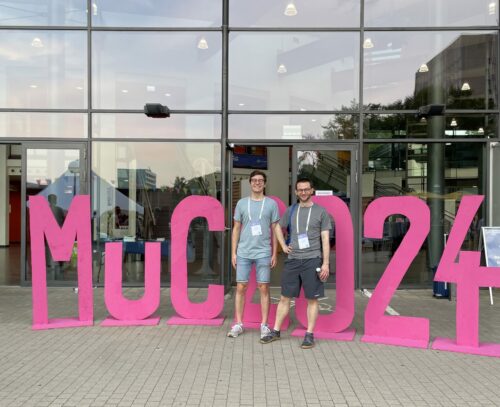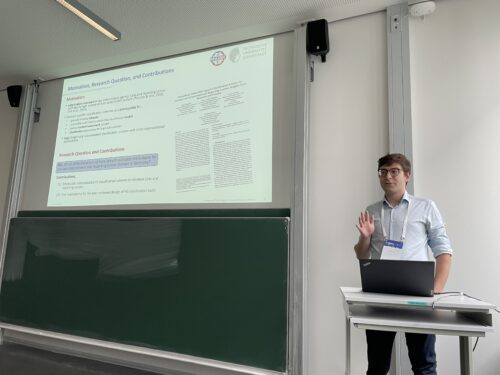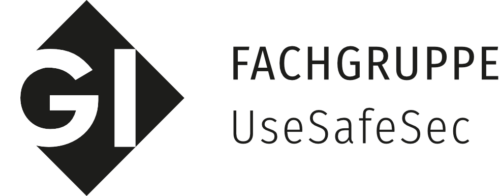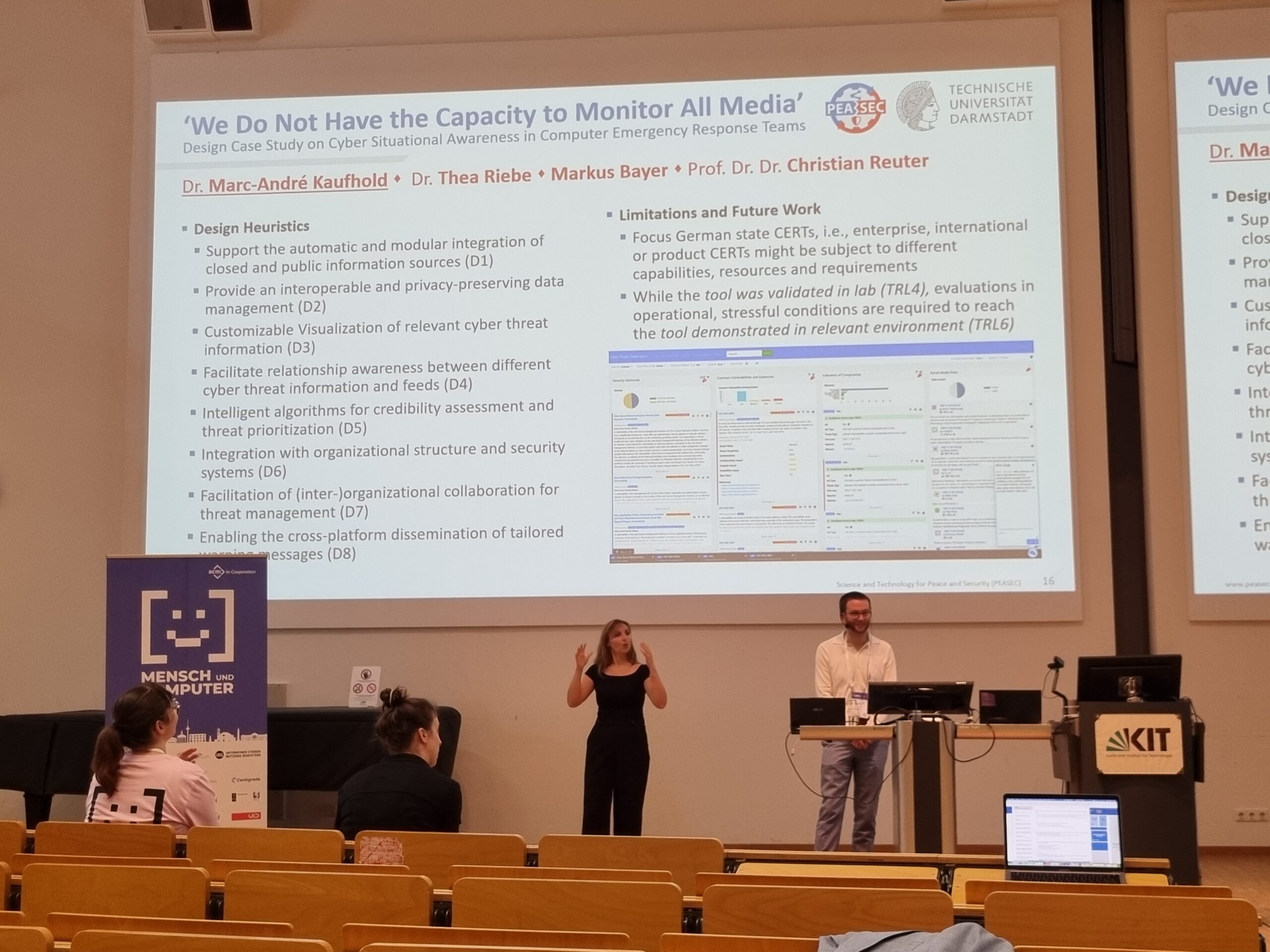Mensch und Computer 2024 (1. – 4. September 2024, Karlsruhe)

The “Mensch und Computer” (MuC) conference, launched in 2001, is the largest conference series on human-computer interaction in Europe. MuC offers participants from science and industry a platform for contributions and discussions on innovative forms of interaction between people and digital technology, human-centered development methods, interactive applications, and other topics in the field between users, teams, and communities on the one hand and information and communication technologies used on the other hand. The aim of the conference is to discuss innovative research results, promote the exchange of information between academia and practitioners, stimulate research activities and training, and sensitize science, practice, and the public to the relevance of human- and task-oriented technology design. Mainly, English-language technical papers and their publication in the ACM Digital Library or Digital Library of the GI promote the worldwide visibility of the scientific results of MuC.
11th Workshop: Mensch-Maschine-Interaktion in Sicherheitskritischen Systemen
The 11th Workshop Mensch-Maschine-Interaktion in Sicherheitskritischen Systemen at Mensch und Computer 2024 focused on contributions to the use of computer-based solutions in areas and situations with direct relevance to people’s lives and well-being (Usable Safety) and contributions to user-oriented concepts of the resilience of technical systems in relation to potential attacks (Usable Security). This workshop was organized by the GI specialist group “Usable Safety & Security” and will take place for the 11th time in a row at Mensch und Computer in 2024. The workshop will take place in close coordination with the organizers of the 10th “Usable Security & Privacy” workshop. The workshop highlighted nine contributions that underwent peer review, presenting an engaging program on topics such as crisis communication, safety-critical design, and security. Additionally, there were insightful discussions about the future of secure digital systems. For more details, visit the official MuC 2024 page and view the full workshop program.

PEASEC contributed Workshop-Proceedings and two papers:
- 11. Workshop Mensch-Maschine-Interaktion in sicherheitskritischen Systemen (Paper)
Marc-André Kaufhold, Tilo Mentler, Simon Nestler, Christian Reuter - Towards an Online Hate Speech Classification Scheme for German Law Enforcement and Reporting Centers: Insights from Research and Practice (Paper)
Julian Bäumler, Marc-André Kaufhold, Georg Voronin, Christian Reuter - Towards a Security Advisory Content Retrieval and Extraction System for Computer Emergency Response Teams (Paper)
Marc-André Kaufhold, Julian Bäumler, Nicolai Koukal, Christian Reuter
Meeting of the GI Special Interest Group “Usable Safety & Security” (UseSafeSec)

The “Usable Safety & Security” (UseSafeSec) special interest group of the Gesellschaft für Informatik focuses on human-computer interaction in safety-critical systems. It aims to improve system security by addressing both technical reliability and user-centered aspects like usability, examining both aspects of Safety (functional protection against unintended events) and Security (protection from attacks). As the current spokesperson, Marc-André Kaufhold (PEASEC) organized the meeting of the UseSafeSec special interest group and participated in the steering committee meeting of the GI department of Mensch-Computer-Interaktion (MCI). Both meetings take place annually at the Mensch und Computer conference. For more information, visit UseSafeSec.
Invited Talk: CHI 2024 Best Paper Award
 Dr. Marc-André Kaufhold was invited to speak at the MuC 2024 conference, where he presented PEASEC’s CHI paper, recognized with the Best Paper Award. The paper, titled ‘We Do Not Have the Capacity to Monitor All Media’: A Design Case Study on Cyber Situational Awareness in Computer Emergency Response Teams,” the design process of the Cyber Threat Observatory, a tool developed to enhance Cyber Situational Awareness for Computer Emergency Response Teams (CERTs). It combines qualitative interviews, interactive workshops, and scenario-based evaluations to create a real-time dashboard for monitoring cyber threats. Developed as part of the CYWARN project, this tool helps CERTs by automating the collection, analysis, and communication of cyber threat data using AI and visual analytics. Read our previous article for more information.
Dr. Marc-André Kaufhold was invited to speak at the MuC 2024 conference, where he presented PEASEC’s CHI paper, recognized with the Best Paper Award. The paper, titled ‘We Do Not Have the Capacity to Monitor All Media’: A Design Case Study on Cyber Situational Awareness in Computer Emergency Response Teams,” the design process of the Cyber Threat Observatory, a tool developed to enhance Cyber Situational Awareness for Computer Emergency Response Teams (CERTs). It combines qualitative interviews, interactive workshops, and scenario-based evaluations to create a real-time dashboard for monitoring cyber threats. Developed as part of the CYWARN project, this tool helps CERTs by automating the collection, analysis, and communication of cyber threat data using AI and visual analytics. Read our previous article for more information.
- ‘We Do Not Have the Capacity to Monitor All Media’: A Design Case Study on Cyber Situational Awareness in Computer Emergency Response Teams.” (Paper)
Marc-André Kaufhold, Thea Riebe, Markus Bayer, Christian Reuter
